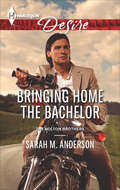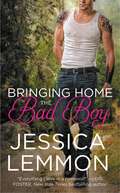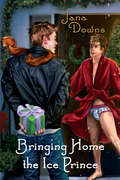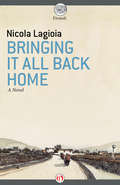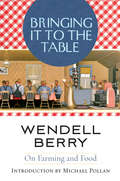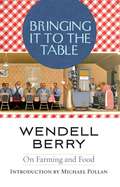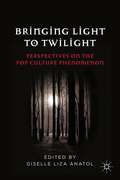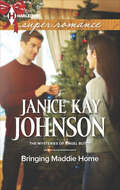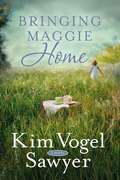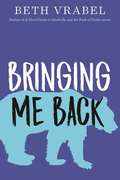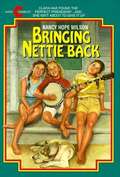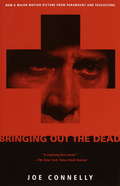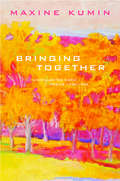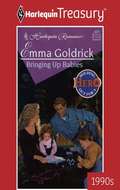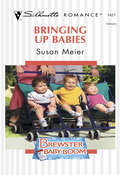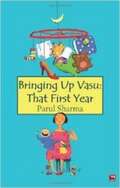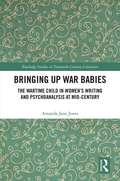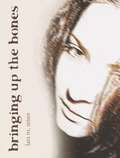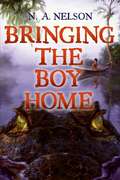- Table View
- List View
Bringing Home the Bachelor (The Bolton Brothers #2)
by Sarah M. AndersonIn this Bolton Brothers novel, Sarah M. Anderson shows how one single mom at a bachelor auction can bring home the wildest ride of her life! Jenny Wawasuck knows that "Wild" Billy Bolton is all wrong for a good girl like her. But then she sees the bond Billy forms with her son?and feels how Billy's touch burns her skin, how his kiss ignites desires she's long ignored. So she brings him home from the charity bachelor auction. Now Billy has one night to stake his claim. But in a world filled with blackmailers and gold diggers, can a millionaire bad boy and a sweet single mom turn one chance into forever?
Bringing Home the Bad Boy (Second Chance #1)
by Jessica LemmonThe Bad Boy Is BackEvan Downey needs a new beginning. Since the death of his wife five years ago, the brilliant tattoo artist has shut himself away in a prison of grief that not even his work can break him out of-and what's worse, Evan knows his son Lyon is bearing the brunt of his seclusion. Moving back to the lake town of Evergreen Cove where he spent his childhood summers is his last chance for a fresh start.Charlotte Harris knows she owes it to her best friend's memory to help Evan and his son find their way again, but she can't stop her traitorous heart from skipping a beat every time she looks into Evan's mesmerizing eyes. Charlotte is determined to stay strictly in the Friend Zone-until a mind-blowing night knocks that plan by the wayside. Now, if they're brave enough to let it, Charlotte and Evan might just find a love capable of healing their broken hearts . . .
Bringing Home the Beach (Fountas & Pinnell Classroom, Guided Reading)
by Elizabeth Sayles Mia LewisNIMAC-sourced textbook
Bringing Home the Ice Prince
by Jana DownsAuthor Cole Stanton is hiding in the backwoods of rural North Carolina, nursing grief and an overwhelming sense of loneliness when Eric Sartori shows up on his doorstep. Eric--his editor and friend--is there to get Cole back home to the bustling metropolis of New York. But Eric will have to melt the ice around his prince's heart to keep Cole from spending his Christmas in silence and regret.
Bringing In the New Year
by Grace LinThe New Year is coming! We try to welcome it in. When Jie-Jie sweeps out the old year . . . and Ba-Ba hangs the spring-happiness poems . . . and I put on my new qi pao dress . . . and we all light the way with lanterns . . . the New Year will follow us! Happy New Year, everyone!
Bringing In the New Year
by Grace LinThis exuberant story follows a Chinese American family as they prepare for the Lunar New Year. Each member of the family lends a hand as they sweep out the dust of the old year, hang decorations, and make dumplings. Then it’s time to put on new clothes and celebrate with family and friends. There will be fireworks and lion dancers, shining lanterns, and a great, long dragon parade to help bring in the Lunar New Year. And the dragon parade in our book is extra long–on a surprise fold-out page at the end of the story. Grace Lin’s artwork is a bright and gloriously patterned celebration in itself! And her story is tailor-made for reading aloud.
Bringing It All Back Home
by Nicola LagioiaGiuseppe has red hair, pimples, and an inexhaustible reserve of money in his wallet. Vincenzo is good looking and serious, like any respectable adversary. The third friend is the one telling the story: with caustic precision, this restless narrator records dizzying teenage discoveries, the lazy inertia of the high school years, and the plunge into adulthood. The city is Bari in southern Italy, the time, the 1980s. The era of ideologies has been killed off--the streets are full of optimism; commercial television channels are recalibrating people's desires and aspirations; "something akin to a storm front of madness" is running through Italy's economy. The times are moving fast, and the glow of so much burned money lingers on. And under those ashes lies still more money, smoldering with the desire to be passed from hand to hand.And yet, as the three boys tackle life's challenges, it becomes clear that things are not so simple. Despite their families' evermore luxurious homes, despite the success of their fathers (a businessman obsessed with social climbing, a famous lawyer, and a talented ex-mechanic who has borrowed money from the wrong people), despite their mothers-- or stepmothers--who wear out designer heels walking from one shop window to the next, the radar behind these adolescents' eyes detects unexpected vibrations.Nicola Lagioia has written a mature, angry coming-of-age novel. The writing is taut, perceptive, and precise, reaching sparkling heights in a story of friendship, betrayal, and generational conflict, which ultimately takes us to the beginnings of our own time in history, and to the eternal adolescence of a country that is growing old without ever having grown up.
Bringing It to the Table: On Farming and Food
by Wendell Berry Michael PollanOnly a farmer could delve so deeply into the origins of food, and only a writer of Wendell Berry's caliber could convey it with such conviction and eloquence. Long before Whole Foods organic produce was available at your local supermarket, Berry was farming with the purity of food in mind. For the last five decades, Berry has embodied mindful eating through his land practices and his writing. In recognition of that influence, Michael Pollan here offers an introduction to this wonderful collection.Drawn from over thirty years of work, this collection joins bestsellers The Omnivore's Dilemma, by Pollan, and Animal, Vegetable, Miracle, by Barbara Kingsolver, as essential reading for anyone who cares about what they eat. The essays address such concerns as: How does organic measure up against locally grown? What are the differences between small and large farms, and how does that affect what you put on your dinner table? What can you do to support sustainable agriculture?A progenitor of the Slow Food movement, Wendell Berry reminds us all to take the time to understand the basics of what we ingest. "Eating is an agriculture act," he writes. Indeed, we are all players in the food economy.
Bringing It to the Table: On Farming and Food
by Wendell BerryIntroduction by Michael Pollan Long Before Organic Produce was Available at Your Local Supermarket. Wendell Berry was farming and writing with the purity of food in mind. For the last five decades, he has embodied mindful eating through his land practices and his writing. In recognition of Berry's influence, Michael Pollan offers an introduction to this new collection. "To read the essays in this sparkling anthology," he writes, "many of them dating back to the 1970s and 1980s, is to realize just how little of what we are saying and hearing today Wendell Berry hasn't already said, bracingly, before. " This compendium joins today's bestsellers as essential reading for all who care about what they eat.
Bringing Light to Twilight
by Giselle Liza AnatolThe essays in this collection use the interpretative lens to interrogate the meanings of Meyer's books, making a compelling case for the cultural relevance of Twilight and providing insights on how we can "read" popular culture to our best advantage.
Bringing Maddie Home: Bringing Maddie Home Now You See Me Better Than Gold (The Mysteries of Angel Butte #1)
by Janice Kay JohnsonFirst in the thrilling series from the USA Today–bestselling author: “What a suspenseful tale of love, heartache, forgiveness, hope, secrets, and pain.” —Fresh FictionThere’s always one case . . . The moment police captain Colin McAllister sees her on TV he knows. She may call herself Nell Smith, but she is Maddie Dubeau—the girl who went missing from Angel Butte, Oregon, years ago. She’s haunted Colin, and now the adult version of her is so captivating, he can’t stay away. He wants to help her recover her memories—even solve her case—without crossing a professional line.But distance becomes impossible when the threats against her escalate. It’s clear someone is determined that Nell never remembers what happened to Maddie. Colin must keep her safe so that he can finally bring her home . . . to his home.“Mystery/suspense with a side-helping of romance . . . Janice Kay Johnson is a very good writer. Her characters were likeable and well-developed. She writes a good suspense plot. The amnesia aspect didn’t come across as overly cliché or silly. It was all very well done.” —Romantic Parvenu
Bringing Maggie Home: A Novel
by Kim Vogel SawyerDecades of Loss, an Unsolved Mystery, and a Rift Spanning Three GenerationsHazel DeFord is a woman haunted by her past. While berry picking in a blackberry thicket in 1943, ten-year old Hazel momentarily turns her back on her three-year old sister Maggie and the young girl disappears. Almost seventy years later, the mystery remains unsolved and the secret guilt Hazel carries has alienated her from her daughter Diane, who can’t understand her mother’s overprotectiveness and near paranoia. While Diane resents her mother’s inexplicable eccentricities, her daughter Meghan—a cold case agent—cherishes her grandmother’s lavish attention and affection. When a traffic accident forces Meghan to take a six-week leave-of-absence to recover, all three generations of DeFord women find themselves unexpectedly under the same roof. Meghan knows she will have to act as a mediator between the two headstrong and contentious women. But when they uncover Hazel’s painful secret, will Meghan also be able to use her investigative prowess to solve the family mystery and help both women recover all that’s been lost?
Bringing Me Back
by Beth VrabelNoah is not having a good year. His mom is in prison, he's living with his mom's boyfriend—who he's sure is just waiting until his mother's six month sentence is up to kick him out—and he's officially hated by everyone at his middle school, including his former best friend. It's Noah's fault that the entire football program got shut down after last year. One day, Noah notices a young bear at the edge of the woods with her head stuck in a bucket. A bucket that was almost certainly left outside as part of a school fundraiser to bring back the football team. As days go by, the bear is still stuck—she's wasting away and clearly getting weaker, even as she runs from anyone who tries to help. And she's always alone. Though Noah ignores the taunts at school and ignores his mother's phone calls from jail, he can't ignore the bear. Everyone else has written the bear off as a lost cause—just like they have with Noah. He makes it his mission to help her. But rescuing the bear means tackling his past—and present—head-on. Could saving the bear ultimately save Noah, too?
Bringing Nettie Back
by Nancy Hope WilsonSixth-grader Clara Nelson has always wanted a best friend. When she meets Nettie Knapp, she quickly begins to admire Nettie's drawings and sense of humor. Then, one day, Nettie suffers a stroke. Can Clara find a way to bring her back--to help her be the old, fun-loving girl she used to be?
Bringing Out the Dead
by Joe ConnellyPerhaps only someone who has worked for a decade as a paramedic in Hell's Kitchen -- as Joe Connelly has -- could write a novel as rivetting and fiercely authentic as "Bringing Out The Dead. " Like a reporter at the front, Connelly writes from deep inside the experience, and the result is electrifying. In Frank Pierce, an EMS medic, Connelly gives us a man who is being destroyed by the job of saving people's lives. Addicted to the thrill ("the best drug in the world"), the adventure, and the mission of it, after five years Frank is nevertheless drowning in accumulated grief and guilt: his own and others' ("I grew to understand that my primary role was less about saving lives than about bearing witness"). His wife has left him, he's drinking too much and on the job, and just a month ago, he "helped to kill" Rose, an 18-year-old suffering from asthma. Now Rose won't let him be: he sees her everywhere, she's the waking nightmare of all his failures, both hallucination and projection, yet as realto him as his most intimate thoughts. And it's perhaps in reaction to her death that Frank desperately resurrects Patrick Burke, a patient for w
Bringing Rosie Home
by Loree LoughA kidnapping shattered their family…Rena and Grant VanMeter lived every parent’s worst nightmare when their preschool daughter was abducted. Riddled with guilt and hoping time apart would help them heal, Rena made the hardest decision of her life. But stunning news reunites her with Grant. Rosie has been found.Putting up a united front for their child’s sake isn’t as easy as they thought. Grant hasn’t forgiven Rena for taking her eyes off Rosie for a few critical seconds. And Rena has yet to forgive herself. But their little girl needs them more than ever…
Bringing Together: Uncollected Early Poems 1958-1989
by Maxine Kumin"The power that Kumin draws from and brings to literature is potent and seemingly inexhaustible."--Booklist Collected here for the first time, these early poems inhabit Kumin's own "sneakstorm time," a space one step to the side, where quiet introspection examines the pain of loss, the idealism of youth, and the endurance of the natural world. Her characteristic earthy wisdom snaps with intensity, offering a refreshing perspective on everyday experiences. "New England farm life, modern American history, Jewish identity and a quietly vibrant feminist consciousness provide themes for this gathering from a long and distinguished career."--Publishers Weekly.
Bringing Up Babies
by Emma GoldrickHOLDING OUT FOR A HERO An accidental mom! After the latest in a long line of romantic disasters, Hope Latimore had decided there was only one thing for it--she would have to enter a convent! That or take the job her father had arranged for her as a stand-in nanny. Only Bruce Latimore had neglected to mention that her new boss was Ralph Browne--the man who had made her high school days hell! Hope, the "baby" of the Latimore family, was beginning to think that perhaps the nuns would have been a better idea! But she couldn't leave Eddie and little Melody with a bachelor dad to contend with. Sexy, Ralph might be, but it was clear that this hero knew less than Hope about bringing up kids!
Bringing Up Babies
by Susan MeierLily Andersen only wanted to be the best nanny possible to the adorable Brewster triplets, but Chas Brewster was difficult to ignore. He was handsome, fascinating, and the way he loved the babies called to her most basic instincts.But he was also off-limits! No matter how Lily longed to grow closer to Chas, it was not a good idea to get involved with the boss. Yet as the light-night cuddles led to grown-up kisses, Lily had a hard time remembering her place wasn't in Chas's arms....
Bringing Up Beauty
by Sylvia McnicollWinner of the 1996 Ontario Silver Birch Award. When Elizabeth's family agrees to foster a black Lab puppy until it is ready to be trained as a guide dog, Elizabeth is determined not to grow too attached to it. At first the dog, named "Beauty" by Elizabeth's mom, causes so much trouble -- accidents on neighbor's rugs, a messed up art project, a bathtub flood -- it's easy to remain detached. But when problems in Elizabeth's social life begin to overwhelm her, and her parents are too caught up in their careers to notice, Beauty becomes the only friend she can rely on. Elizabeth must learn to cope when the day comes to send Beauty for guide dog training.
Bringing Up Vasu: That First Year
by Parul SharmaFirst time mom Mira steps out of the hospital with her baby son, aglow with confidence that her aspirations for Supermom-dom will be fulfilled.
Bringing Up War-Babies: The Wartime Child in Women’s Writing and Psychoanalysis at Mid-Century (Routledge Studies in Twentieth-Century Literature)
by Amanda JonesThe figure of the wartime child in the mid-twentieth century unsettles and disturbs. This book employs a range of material – biographical, literary and historical – to chart some of the surprising and unanticipated crossovers between women’s writing and early psychoanalysis in the years of the Second World War and the decades before and after. This volume includes examples of children’s adventure fiction, as well as works written for adult audiences and important and previously unrecognized similarities are noted. The war was a disruptive influence in the lives of all who lived through it. Although active self-censorship is observed in the behaviour and attitudes of adults at this time, this book demonstrates how fictional children are able to articulate feelings such as anxiety and fear that adults were under pressure to conceal or to repress and at times, the figure of the wartime child becomes a surrogate for the writer herself or her suppressed fears and anxiety. When peace returned, this study finds women writers quick to identify and communicate a discomfiting new ambivalence between parents and children.
Bringing Up the Bones
by Lara M. Zeises[From The Front Flap] "Bridget Edelstein is taking a year off before she goes to college, to try to recover from the recent death of Benji, her longtime best friend-turned reluctant boyfriend. Rather than accept support from her friends or family, Bridget turns to Jasper, a wonderful guy willing to nurse her wounded soul--when she lets him. As she comes to terms with life without Benji, and the truth about their relationship, Bridget learns that being able to love deeply and truly is essential even if the one you love doesn't feel the same. More importantly, she discovers that happiness pinned to another person is only an illusion. Now it's time to find happiness on her own."
Bringing the Beach Home
by Laura AtkinsA heartwarming picture book about the healing power of creativity and nature, Bringing the Beach Home follows a young child who finds calm and connection during a day at the shore—and learns how to carry that feeling home."Delicately warm and lovely. This is an understated yet graceful portrait of a child channeling negative feelings into something beautiful." —Kirkus Reviews When the back-and-forth between Mom&’s and Dad&’s houses feels like too much, Rowan finds peace in the sounds of the waves and the feel of the sand. A wind chime made from collected beach treasures becomes a symbol of comfort, resilience, and the power of creating with our feelings.This lyrical story supports emotional regulation and helps children process transitions through grounded, sensory storytelling.What You&’ll Love Inside: • Nature as Comfort: Shows how the peace of the natural world can ease anxiety and foster connection. • Creating with Our Feelings: Encourages emotional expression through imaginative, hands-on projects. • Visual Beauty: Lush, expressive illustrations and a cover rich with detail and texture bring the beach—and Rowan&’s journey—vividly to life. • Family-Centered Resilience: Highlights the strength of family bonds and offers an empowering lens for children navigating shared custody or life&’s many changes.A powerful story that gives children tools to process change—and reminds them that they can carry peace within them wherever they go.
Bringing the Boy Home
by N. A. Nelson"I've seen what the world does to the weak. It'll eat you alive." Tirio was cast out of the Takunami tribe at a very young age because of his disabled foot. But an American woman named Sara adopted him, and his life has only gotten better since. Now, as his thirteenth birthday approaches, things are nearly perfect. So why is he having visions and hearing voices calling him back to the Amazon? Luka has spent his whole life preparing for his soche seche tente, a sixth-sense test all Takunami boys must endure just before their thirteenth birthday. His family's future depends on whether or not he passes this perilous test. His mother has dedicated herself to making sure that no aspect of his training is overlooked . . . but fate has a way of disturbing even the most carefully laid plans. Two young boys. An unforgiving jungle. One shared destiny.
